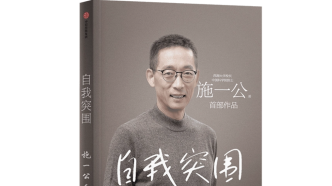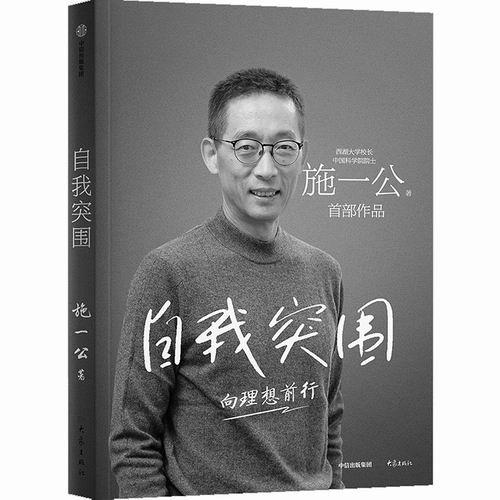

"Self-Breakthrough: Moving Forward to the Ideal", by Shi Yigong, published by CITIC Publishing Group and Daxiang Publishing House in April 2023
[Editor's note] For scientific researchers, reading scientific classics and the latest scientific research papers is the most basic professional reading. As "World Book Day" is approaching, this edition selects a few articles about foreign language reading and shares them The experience of scholars to help readers conquer the academic "Tower of Babel".
Since I was a child, I have a strong emotional thinking and am not good at reading. During my undergraduate study in the Biology Department of Tsinghua University from 1985 to 1989, I never read any English professional journals. I have only received two trainings related to English reading.
One is the "Biological English" series of lectures given by Mr. Pu Muming, the head of the department, which I took during the summer vacation of 1986. I vaguely remember that Mr. Pu asked us to read some popular English articles on the discovery of the DNA double helix structure. interesting. But the course time was short, and I didn't develop the habit of reading English articles after the summer vacation.
The second is related to the course "Biochemistry". In stark contrast to the current Tsinghua School of Life Sciences, all the basic and professional courses during my university use Chinese textbooks, and the teachers teach in Chinese. Only "Biochemistry" taught by Mr. Zheng Changxue adopted "Lehninger Principles of Biochemistry", and Mr. Zheng asked us to read 10-20 pages of textbooks after each class, so most of the students felt that professional English Reading ability has improved.
From April to early July 1990, I spent the first three months in the United States at Iowa State University in Ames, Iowa, most of which were taught by Professor Herbert Fromm I do rotations in the laboratory, and follow Liu Feng and Dong Qun to do research. The most difficult thing for me at the time was reading professional papers.
Once, Fromm asked me to explain an article in the "Journal of Biological Chemistry" at a group meeting. I started reading two days in advance, and it took me 6 hours to read the first time. I had to rely on English-Chinese dictionaries for many new words, and I hadn't fully understood some key content in the article. At that time, I felt that the article in the "Journal of Biological Chemistry" was so long and difficult to understand! It was a bit miserable. In order to make a good impression on Professor Fromm and my brothers and sisters, I spent several hours reading it a second time the next day and made a summary. My performance at the group meeting on the third day finally did not embarrass Tsinghua. However, I have no idea how much time I spent on this article.
After I transferred to Johns Hopkins University in July 1990, I was in the same doctoral program with Yu Yihua, who had an undergraduate degree from Peking University. Yu Yihua was one year older than me. Before coming to Baltimore, he had been a graduate student at the University of Hawaii for a year, and his ability to read scientific research papers was much better than mine. He often reads "Science" and "Nature" magazines with relish in the project office. I am very greedy, and I don't understand the meaning of those boring articles. He told me he was reading interesting science news.
What can science news mean? Yu Yihua told me several stories: how David Baltimore, president of Rockefeller University and Nobel laureate, got into a quagmire, how fierce the debate over human genome sequencing was, who discovered HIV (Human Immunodeficiency Virus), and so on. I really didn't expect that there would be so much content that I was interested in and could understand in academic journals.
Since then, every new issue of "Science" and "Nature" arrived, and I began to try to read the news and research progress introductions in it. These contents often appear in columns such as "News and Commentary", "Research News", "News and Viewpoints", and "Perspective". The writing is plain and easy to understand compared with professional scientific research papers. Sometimes, I also tell my colleagues or friends the scientific research news I read, and the colleagues' questions and interactions are better encouragement to me. In addition to "Science" and "Nature", I often read "Scientific American" magazine.
Unlike very professional journals such as "Cell" and "Journal of Biochemistry", a considerable part of the content of "Science" and "Nature" is used for popular science education.
The "Perspective" column of "Science" and the "News and Viewpoints" column of "Nature" are both in-depth introductions to important scientific papers. They usually have 1 to 3 pages, which are relatively easy to understand and easy to get started. After reading these articles, it feels much better to read the original scientific paper. And you can compare your own experience with the analysis of experts, find gaps, and sometimes even regain a little confidence.
From working at Princeton University in 1998 to working as a professor at Tsinghua University, I always tell all young people in my laboratory (including undergraduates, masters, doctoral students, and postdoctoral students) the following points about my experience in reading scientific research papers. Hope students learn from me.
1. Every student is asked to pay attention to "Science" and "Nature" every week, and students in the field of life sciences should also pay attention to "Cell". If time is limited, just spend an hour a week reading the titles of articles in these weekly journals and the abstracts of scientific research papers related to your research field. In this way, students can basically keep track of the most important discoveries and progress in this field, and at the same time broaden their horizons, and generally know the dynamics of other fields.
2. If you have enough time, you can carefully read the news and scientific research papers in "Science" and "Nature". If the scientific research paper is published in the "News and Views" or "Perspective" column, read these articles first. This kind of introductory article will refine the questions, just like a teacher explaining the ins and outs of the paper to students in advance, and reading the original paper for students helps a lot.
3. When reading a specific scientific research paper, the most important thing is to understand the main line logic of the article. All the ideas in the article are described according to this main line logic. Therefore, I usually read the "Introduction" part first, and then quickly look at the data display graph in the main text. After probably knowing the main line, I read "Results" and "Discussion" word by word.
4. When encountering some obscure experiments or result analysis, don't spend too much time delving into it, but try to read the article in one go. Perhaps your question has been answered in the following content. This is very similar to listening to an academic lecture. If you want to understand every detail and pay attention to every technical detail, then you will not only be very tired listening to academic lectures, but may also affect your understanding of the logical reasoning and core conclusions of the entire lecture because you delve into a small technical link.
5. For some important articles and scientific research papers in your own field, you should read them intensively. For every paper related to your own topic, you must read it word for word. For these papers, not only must you fully understand and understand the details, analysis process, and conclusions of each experiment, but you must also think about the influence and inspiration of these experiments and conclusions on your own topics, and put forward your own opinions.
6. The reading level of scientific papers is progressive. Everyone struggles at first, so don't be discouraged if you feel that way. Persistence is very important, and you will definitely get better. When you have a problem or have a brilliant analysis, you should discuss it with your brother, sister or mentor.
7. An important part of scientific research training is the reading of scientific research papers. Every doctoral student must undergo rigorous training in reading scientific research papers. In addition to your own habitual reading, you should also take one or two courses focusing on reading and analyzing professional literature at the postgraduate level, and you should also have regular scientific research paper discussions in the laboratory. If there is no such discussion in your lab, students can organize it spontaneously.
8. The previous articles discuss how to improve the reading ability of scientific research papers, but once you get started, you must learn to read critically. Don't be superstitious about published papers, even in very good journals. Always remind yourself: Is the logic of the paper rigorous, is the data reliable, does the experimental evidence support the conclusion, can you come up with a better experiment, can you ask new important questions based on this paper, etc.
There is a sky beyond the sky, reading scientific research papers is a very simple but also very profound thing. Ordinary students are often satisfied with understanding and thoroughly reading a good paper, while excellent students will draw inferences from one instance and find relevant references to get a comprehensive understanding of the history and current situation of the entire field, and look forward to the future progress of the field.
I knew nothing about academic papers from 1990 to 1996 when I became a postdoctoral fellow, and I often helped my colleagues analyze them. I once thought I had reached the level of proficiency. But there is one thing that makes me see my serious shortcomings, and I am quite ashamed.
1996 was the most exciting year for the discovery of Smad proteins and the research on TGF-β (transforming growth factor-β) signal transduction. The Whitman lab at Harvard Medical School published an article titled "Transcriptional companions of MAD proteins in the TGF-β signaling pathway" in the October issue of Nature. After reading it, I happened to meet Joan Massago, a well-known scholar in the field of TGF-β, and commented to Joan: "I don't know why this article was published in Nature as a long article, they just found Another Smad interacting protein, and the data quality is very average.” To my complete surprise, Joan responded to me immediately: “I disagree with your point of view, this article links cytoplasmic Smad proteins to the nucleus and identifies With a transcription factor as its interacting protein, the TGF-β signaling pathway is now complete, which is an excellent Nature article."
This incident touched me a lot. It turns out that the master's vision and taste are far superior to mine. Since then, I have also begun to weigh the importance of an article from the perspective of the development of the entire field. This matter has had a very important impact on my subsequent review of important international academic journals and the choice of research topics in my laboratory. .
Nowadays, I read a scientific paper in this field very smoothly, and I can often see some key points that the author did not think of or analyze. Looking back on the past, I am full of emotions. I am grateful to Pu Muming, Zheng Changxue, Yu Yihua, John Dejialei, Jeremy Berger, Joan Massago and other teachers and colleagues for their help. I am very careful and attentive.
I hope that all the students can also read scientific research papers in English through hard work and persistence.
(The author is the first president of West Lake University and an academician of the Chinese Academy of Sciences. This article is excerpted from "Self-Breakthrough: Towards the Ideal", with deletions. The original title is "My Road to Improving Professional English Reading Ability")